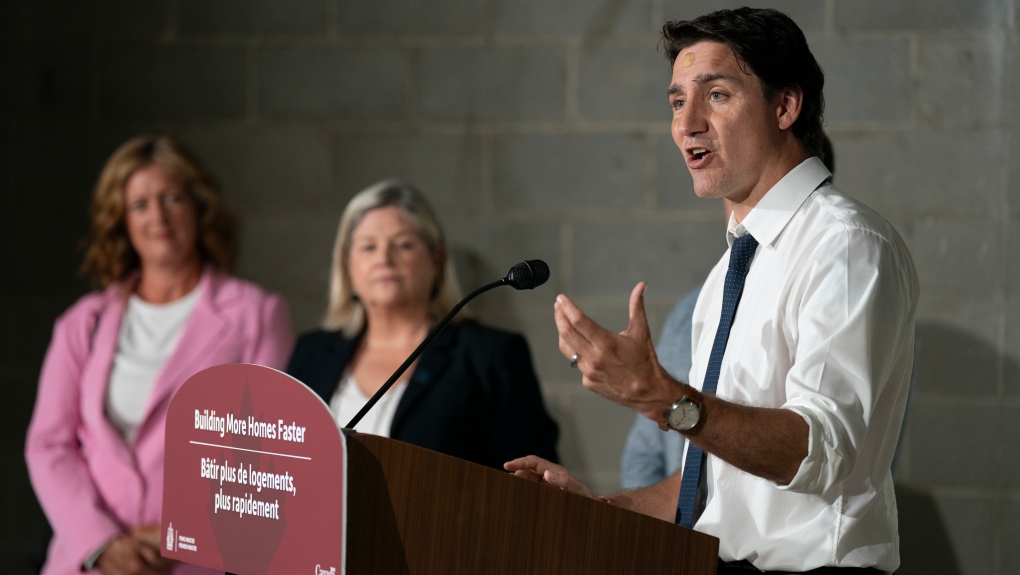Less than a week after naming his new cabinet vowing a renewed focus on the concerns of Canadians, the one name Prime Minister Justin Trudeau couldn’t keep out of his mouth on Monday was Pierre Poilievre. At a housing announcement Trudeau brought the Conservative leader up multiple times, from panning his policy proposals, to his leadership style.
Isn’t “cuts and be angry” the conservative playbook?
Totally. The Conservatives have moved on to “Let’s be Republicans” so now the Liberals can be conservatives and we’re not supposed to notice.
I’m not sure this is done with as malicious and conscious intent as your comment seems to suggest though. The Cons are seeing their voter base go hard right into MAGA land, and they know they need to follow to remain being electable. It’s pandering to their base that led to the Republicans to end up with nutjobs that make Sarah Palin look moderate, and it’s that same pandering the led to Daniel Smith making it to (and holding onto) office. And this voter base shift is also affecting the Liberals - the disillusioned former Conservative voters that didn’t jump aboard the choo-choo train to wackoland still demand their voice be heard. So Liberal politicians will have to make more changes to their stances to reach out to them, resulting in a gradual shift right for them as well.
Yeah, but malicious or not, it’s still happening. Too many Canadians want to be America.
This makes me sad.
Always has been.
I can’t believe anyone supports Poilievre. His cartoon libertarianism is so far right, not even Republicans in the US go that far anymore. No serious economist, anywhere on the spectrum, is a libertarian.
I can’t help but laugh each time I see him and his ‘new’ look. No glasses with jeans/shirt and a sports jacket.
“He’s just like us” - Conservatives probably
it worked for President Zelenskyy - although I think he just stopped dressing up for work and now hangs out in his at-home crummies - and if we ignore the stark differences in character and humanity one could assume it’d work for him too.
Worked for Zelenskyy? What the hell are you even talking about? He wore suits up until his country was attacked by Russia and will likely not go back to suits until Russia is forced out of Ukraine.
Try not to compare a man of integrity and honour with Peter "Canadians can opt out of inflation by buying Crypto’ Poilievre.
Wanting the government to spend only as much as it earns seems like common sense to me.
Basic macroeconomics: The budget of a sovereign government with control over monetary policy is fundamentally not like a family budget.
it’s a noble “father knows best” bit of wisdom, but you’ll find ANY person, organization or even government unable to save during ‘up’ years - in this case because it’s criticized for not dumping spare money at some cause - needs to borrow money or run a deficit in the ‘down’ years or when investing in something with delayed benefits.
This is actually how banks make money, but it’s also a neat-o vehicle for investment. Go read about it!
This bit of falsely sage advice is a neat-o diversion from the fact that money has been used either to prevent economic collapse during a 100-year pandemic - I know: Milhouse is an expert in managing a country during a global lethal pandemic - or to restart programmes to allow people to work more and generate more tax revenue that were ditched by ‘small government / fuck the plebes’ administration before, and/or resume maintenance work skipped or killed by those same “looks good this year, fuck the next guy’s budget” administrators.
Technical debt also accrues; and any wealthy barber will tell you to shift expensive debts to cheaper debts; and so we repair bridges with loans because we value the things we’d lose more if we didn’t.
Stop with the “neither a borrower nor a lender be” bullshit that started as an adage to sloppy aristocrats. It’s not even a smart rule for a single normal person, let alone a family or a government. It’s short-sighted and shallow.
I’m about as anti-Poilievre as it gets but Justin needs to address why so many people are angry rather than say they’re un-Canadian. He has done remarkably little to remedy systemic problems in Canada, including housing, which makes the venue for his comments especially tone-deaf.
The article lays most of it out, but the Federal government really can’t do much about housing, since interest rates are set by an independent central bank, and housing development and zoning is a provincial issue. Could you imagine how much Ontario or Alberta would start pissing and moaning if the Feds tried to assert any authority there?
Apart from something seriously dramatic like changing taxation on mortgage interest (make it deductible on primary residences only, and not additional properties), or creating a heavy wealth tax on additional properties - both of which would be political suicide for any Federal party - the issue isn’t something that can be addressed by the Feds. For the record, I think both of those ideas would be enormously beneficial to Canadians who are looking to own homes, as well as address the cost of housing, but the only party that has the will to make real changes like that are the Federal NDP.
And before anyone jumps on “but what about immigration”, the high immigration rates are what helps bring unemployment up, which is desirable during a period where you’re trying to squash inflation, and also helps preserve the tax base, since landed Canadians are having less children. Not to mention filling certain skilled labour categories.
So it’s a hell of a Gordian knot, but it certainly has very little to do with the Feds.
Disagree. The main problem is lack of housing. We need to build more, a lot more, and the Feds control CMHC. They’ve been content to let housing be the biggest GDP item because it serves the NIMBYs who see their overpriced house as an investment (and I say this as a homeowner whose house has appreciated 250% since I bought it)
Again, which level of government controls zoning and housing permits? What about utilities, roads, firefighters, water rights, etc?
Right, provinces. So without provinces doing enough, the CMHC cannot have any direct effect on the national housing shortages.
Maybe things are different in your neck of the woods but I have some experience in the industry (apartments, not single-family) and neither permits, utilities, roads nor firefighters has been a significant issue. Zoning, sometimes - but municipal governments are well aware of the housing shortage and have been willing to play ball (again, IME). BTW most of the issues you raise are under municipal purview, not provincial.
I’d say cost of construction is the main problem. In NB it’s impossible to build anything under 200k per door, and even that target requires some vigilance to hit. That’s why there’s an inverted bell curve going on with a bunch of slums at the low end and a bunch of luxury apartments at the top, but hardly anything in the middle.
Absolutely right on the provincial / municipal differences for a number of those points I raised.
Also correct that most of the shortages are due to NIMBYism and a lot of refusal / blockages on city central neighbourhoods being densified in the name of “property values”. They really need to stop asking the public and start telling instead. Maybe we could get something done that way.
So of I understand this correctly, that means there is very little the federal government can do besides use indirect levers to decrease cost, like:
- Further increase immigration to ensure there are enough workers to avoid labour cost from increasing.
- Keep driving inflation down so general costs don’t get worse.
- Resist calls for short term relief schemes which will increase prices by letting people spend more.
What else can be done at the federal level?
The big cost savings items all seem like they are Municipal and Provincial, like: getting rid of minimum parking requirements, deceasing per unit land costs, and allowing more units to be built in the communities people want to live in.
Sort of. One thing Feds/CMHC could do is funnel serious money into affordable housing programs to build more housing (not subsidized demand, as the NB government is doing, which only enriches landlords). There are already non-profits and community orgs who could manage these buildings once complete.
Bitcoin Milhouse voted against helping all Canadians, again, just to spite Justin Trudeau.
The prime minister criticized Poilievre for opposing the new federal dental care program. Trudeau said that program has allowed hundreds of thousands of families to send their children to the dentist for the first time.
“He chose to vote against, and to stand against and try to block … in the House, the delivering of dental care for vulnerable Canadians,” Trudeau said. “Why would you do that?”
https://www.cbc.ca/news/politics/poilievre-trudeau-anger-fear-cuts-1.6923410
Also:
“That’s not Canada. That’s not how we build a stronger future. That’s not how we’ve gotten through the challenging times we’ve had in the past.”
I agree.
Now do something about housing, inflation, and the CRTC please.
Now do something about housing, inflation, and the CRTC please.
Such as? Inflation is already down to 2.8% which is in the range the BoC follows.
Housing is a provincial issue, there’s very little the federal government can do about it.
The feds can legally purchase apartment blocks in any city and operate them as low income housing.
They can do something about it … the feds just don’t want to become landlords because it’s complicated.
Real leadership would recognize that leaving it up to provincial/municipal money-hungry airheads is just passing the buck.
They have virtually no way to control supply, they don’t control zoning, don’t control infrastructure. Even if they buy up some apartments, which they would need to convince people to sell, it would be a tiny drop in the housing problem bucket.
If we want housing solved we need to do it at the provincial and municipal levels, and stop electing conservatives in at those levels.
Winnipeg, like Montreal, etc, has a ton of older apartment blocks (or 3 story walk-ups in Montreal) that need no rezoning or increased infrastructure. Purchasing a few of those in strategic areas would help to bring down rents.
There are a ton of options available, and since municipal/provincial gov’ts aren’t doing anything the feds need to step up to the plate.
And people already live there, the government would have to ask them to sell. There aren’t a bunch of empty unowned blocks for the federal government to buy, and they can’t force the legal owners to sell.
I’m speaking of apartment blocks that are rented, not condo units that are purchased.
Inflation isn’t something that anyone really gets to “do anything” about. The most successful applied economic model to explain inflation boils down to “when people start talking en masse about expecting inflation, companies take that as license to raise prices.” Every other economic model fails to reliably explain, predict, or resolve inflation, including the most popular - changes in interest rates.





